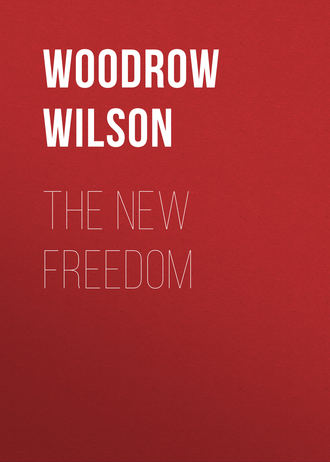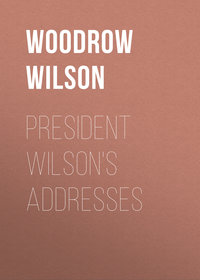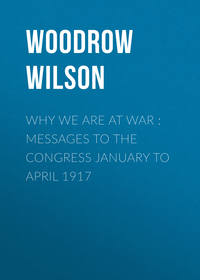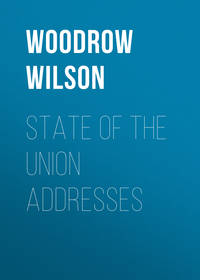 полная версия
полная версияThe New Freedom
I am striving to indicate my belief that our legislative methods may well be reformed in the direction of giving more open publicity to every act, in the direction of setting up some form of responsible leadership on the floor of our legislative halls so that the people may know who is back of every bill and back of the opposition to it, and so that it may be dealt with in the open chamber rather than in the committee room. The light must be let in on all processes of law-making.
Legislation, as we nowadays conduct it, is not conducted in the open. It is not threshed out in open debate upon the floors of our assemblies. It is, on the contrary, framed, digested, and concluded in committee rooms. It is in committee rooms that legislation not desired by the interests dies. It is in committee rooms that legislation desired by the interests is framed and brought forth. There is not enough debate of it in open house, in most cases, to disclose the real meaning of the proposals made. Clauses lie quietly unexplained and unchallenged in our statutes which contain the whole gist and purpose of the act; qualifying phrases which escape the public attention, casual definitions which do not attract attention, classifications so technical as not to be generally understood, and which every one most intimately concerned is careful not to explain or expound, contain the whole purpose of the law. Only after it has been enacted and has come to adjudication in the courts is its scheme as a whole divulged. The beneficiaries are then safe behind their bulwarks.
Of course, the chief triumphs of committee work, of covert phrase and unexplained classification, are accomplished in the framing of tariffs. Ever since the passage of the outrageous Payne-Aldrich Tariff Act our people have been discovering the concealed meanings and purposes which lay hidden in it. They are discovering item by item how deeply and deliberately they were deceived and cheated. This did not happen by accident; it came about by design, by elaborated, secret design. Questions put upon the floor in the House and Senate were not frankly or truly answered, and an elaborate piece of legislation was foisted on the country which could not possibly have passed if it had been generally comprehended.
And we know, those of us who handle the machinery of politics, that the great difficulty in breaking up the control of the political boss is that he is backed by the money and the influence of these very people who are intrenched in these very schedules. The tariff could never have been built up item by item by public discussion, and it never could have passed, if item by item it had been explained to the people of this country. It was built up by arrangement and by the subtle management of a political organization represented in the Senate of the United States by the senior Senator from Rhode Island, and in the House of Representatives by one of the Representatives from Illinois. These gentlemen did not build that tariff upon the evidence that was given before the Committee on Ways and Means as to what the manufacturer and the workingmen, the consumers and the producers, of this country want. It was not built upon what the interests of the country called for. It was built upon understandings arrived at outside of the rooms where testimony was given and debate was held.
I am not even now suggesting corrupt influence. That is not my point. Corruption is a very difficult thing to manage in its literal sense. The payment of money is very easily detected, and men of this kind who control these interests by secret arrangement would not consent to receive a dollar in money. They are following their own principles,—that is to say, the principles which they think and act upon,—and they think that they are perfectly honorable and incorruptible men; but they believe one thing that I do not believe and that it is evident the people of the country do not believe: they believe that the prosperity of the country depends upon the arrangements which certain party leaders make with certain business leaders. They believe that, but the proposition has merely to be stated to the jury to be rejected. The prosperity of this country depends upon the interests of all of us and cannot be brought about by arrangement between any groups of persons. Take any question you like out to the country,—let it be threshed out in public debate,—and you will have made these methods impossible.
This is what sometimes happens: They promise you a particular piece of legislation. As soon as the legislature meets, a bill embodying that legislation is introduced. It is referred to a committee. You never hear of it again. What happened? Nobody knows what happened.
I am not intimating that corruption creeps in; I do not know what creeps in. The point is that we not only do not know, but it is intimated, if we get inquisitive, that it is none of our business. My reply is that it is our business, and it is the business of every man in the state; we have a right to know all the particulars of that bill's history. There is not any legitimate privacy about matters of government. Government must, if it is to be pure and correct in its processes, be absolutely public in everything that affects it. I cannot imagine a public man with a conscience having a secret that he would keep from the people about their own affairs.
I know how some of these gentlemen reason. They say that the influences to which they are yielding are perfectly legitimate influences, but that if they were disclosed they would not be understood. Well, I am very sorry, but nothing is legitimate that cannot be understood. If you cannot explain it properly, then there is something about it that cannot be explained at all. I know from the circumstances of the case, not what is happening, but that something private is happening, and that every time one of these bills gets into committee, something private stops it, and it never comes out again unless forced out by the agitation of the press or the courage and revolt of brave men in the legislature. I have known brave men of that sort. I could name some splendid examples of men who, as representatives of the people, demanded to be told by the chairman of the committee why the bill was not reported, and who, when they could not find out from him, investigated and found out for themselves and brought the bill out by threatening to tell the reason on the floor of the House.
Those are private processes. Those are processes which stand between the people and the things that are promised them, and I say that until you drive all of those things into the open, you are not connected with your government; you are not represented; you are not participants in your government. Such a scheme of government by private understanding deprives you of representation, deprives the people of representative institutions. It has got to be put into the heads of legislators that public business is public business. I hold the opinion that there can be no confidences as against the people with respect to their government, and that it is the duty of every public officer to explain to his fellow-citizens whenever he gets a chance,—explain exactly what is going on inside of his own office.
There is no air so wholesome as the air of utter publicity.
There are other tracts of modern life where jungles have grown up that must be cut down. Take, for example, the entirely illegitimate extensions made of the idea of private property for the benefit of modern corporations and trusts. A modern joint stock corporation cannot in any proper sense be said to base its rights and powers upon the principles of private property. Its powers are wholly derived from legislation. It possesses them for the convenience of business at the sufferance of the public. Its stock is widely owned, passes from hand to hand, brings multitudes of men into its shifting partnerships and connects it with the interests and the investments of whole communities. It is a segment of the public; bears no analogy to a partnership or to the processes by which private property is safeguarded and managed, and should not be suffered to afford any covert whatever to those who are managing it. Its management is of public and general concern, is in a very proper sense everybody's business. The business of many of those corporations which we call public-service corporations, and which are indispensable to our daily lives and serve us with transportation and light and water and power,—their business, for instance, is clearly public business; and, therefore, we can and must penetrate their affairs by the light of examination and discussion.
In New Jersey the people have realized this for a long time, and a year or two ago we got our ideas on the subject enacted into legislation. The corporations involved opposed the legislation with all their might. They talked about ruin,—and I really believe they did think they would be somewhat injured. But they have not been. And I hear I cannot tell you how many men in New Jersey say: "Governor, we were opposed to you; we did not believe in the things you wanted to do, but now that you have done them, we take off our hats. That was the thing to do, it did not hurt us a bit; it just put us on a normal footing; it took away suspicion from our business." New Jersey, having taken the cold plunge, cries out to the rest of the states, "Come on in! The water's fine!" I wonder whether these men who are controlling the government of the United States realize how they are creating every year a thickening atmosphere of suspicion, in which presently they will find that business cannot breathe?
So I take it to be a necessity of the hour to open up all the processes of politics and of public business,—open them wide to public view; to make them accessible to every force that moves, every opinion that prevails in the thought of the people; to give society command of its own economic life again, not by revolutionary measures, but by a steady application of the principle that the people have a right to look into such matters and to control them; to cut all privileges and patronage and private advantage and secret enjoyment out of legislation.
Wherever any public business is transacted, wherever plans affecting the public are laid, or enterprises touching the public welfare, comfort, or convenience go forward, wherever political programs are formulated, or candidates agreed on,—over that place a voice must speak, with the divine prerogative of a people's will, the words: "Let there be light!"
VII
THE TARIFF—"PROTECTION," OR SPECIAL PRIVILEGE?
Every business question, in this country, comes back, sooner or later, to the question of the tariff. You cannot escape from it, no matter in which direction you go. The tariff is situated in relation to other questions like Boston Common in the old arrangement of that interesting city. I remember seeing once, in Life, a picture of a man standing at the door of one of the railway stations in Boston and inquiring of a Bostonian the way to the Common. "Take any of these streets," was the reply, "in either direction." Now, as the Common was related to the winding streets of Boston, so the tariff question is related to the economic questions of our day. Take any direction and you will sooner or later get to the Common. And, in discussing the tariff you may start at the centre and go in any direction you please.
Let us illustrate by standing at the centre, the Common itself. As far back as 1828, when they knew nothing about "practical politics" as compared with what we know now, a tariff bill was passed which was called the "Tariff of Abominations," because it had no beginning nor end nor plan. It had no traceable pattern in it. It was as if the demands of everybody in the United States had all been thrown indiscriminately into one basket and that basket presented as a piece of legislation. It had been a general scramble and everybody who scrambled hard enough had been taken care of in the schedules resulting. It was an abominable thing to the thoughtful men of that day, because no man guided it, shaped it, or tried to make an equitable system out of it. That was bad enough, but at least everybody had an open door through which to scramble for his advantage. It was a go-as-you-please, free-for-all struggle, and anybody who could get to Washington and say he represented an important business interest could be heard by the Committee on Ways and Means.
We have a very different state of affairs now. The Committee on Ways and Means and the Finance Committee of the Senate in these sophisticated days have come to discriminate by long experience among the persons whose counsel they are to take in respect of tariff legislation. There has been substituted for the unschooled body of citizens that used to clamor at the doors of the Finance Committee and the Committee on Ways and Means, one of the most interesting and able bodies of expert lobbyists that has ever been developed in the experience of any country,—men who know so much about the matters they are talking of that you cannot put your knowledge into competition with theirs. They so overwhelm you with their familiarity with detail that you cannot discover wherein their scheme lies. They suggest the change of an innocent fraction in a particular schedule and explain it to you so plausibly that you cannot see that it means millions of dollars additional from the consumers of this country. They propose, for example, to put the carbon for electric lights in two-foot pieces instead of one-foot pieces,—and you do not see where you are getting sold, because you are not an expert. If you will get some expert to go through the schedules of the present Payne-Aldrich tariff, you will find a "nigger" concealed in almost every woodpile,—some little word, some little clause, some unsuspected item, that draws thousands of dollars out of the pockets of the consumer and yet does not seem to mean anything in particular. They have calculated the whole thing beforehand; they have analyzed the whole detail and consequence, each one in his specialty. With the tariff specialist the average business man has no possibility of competition. Instead of the old scramble, which was bad enough, we get the present expert control of the tariff schedules. Thus the relation between business and government becomes, not a matter of the exposure of all the sensitive parts of the government to all the active parts of the people, but the special impression upon them of a particular organized force in the business world.
Furthermore, every expedient and device of secrecy is brought into use to keep the public unaware of the arguments of the high protectionists, and ignorant of the facts which refute them; and uninformed of the intentions of the framers of the proposed legislation. It is notorious, even, that many members of the Finance Committee of the Senate did not know the significance of the tariff schedules which were reported in the present tariff bill to the Senate, and that members of the Senate who asked Mr. Aldrich direct questions were refused the information they sought; sometimes, I dare say, because he could not give it, and sometimes, I venture to say, because disclosure of the information would have embarrassed the passage of the measure. There were essential papers, moreover, which could not be got at.
Take that very interesting matter, that will-o'-the-wisp, known as "the cost of production." It is hard for any man who has ever studied economics at all to restrain a cynical smile when he is told that an intelligent group of his fellow-citizens are looking for "the cost of production" as a basis for tariff legislation. It is not the same in any one factory for two years together. It is not the same in one industry from one season to another. It is not the same in one country at two different epochs. It is constantly eluding your grasp. It nowhere exists, as a scientific, demonstrable fact. But, in order to carry out the pretences of the "protective" program, it was necessary to go through the motions of finding out what it was. I am credibly informed that the government of the United States requested several foreign governments, among others the government of Germany, to supply it with as reliable figures as possible concerning the cost of producing certain articles corresponding with those produced in the United States. The German government put the matter into the hands of certain of her manufacturers, who sent in just as complete answers as they could procure from their books. The information reached our government during the course of the debate on the Payne-Aldrich Bill and was transmitted,—for the bill by that time had reached the Senate,—to the Finance Committee of the Senate. But I am told,—and I have no reason to doubt it,—that it never came out of the pigeonholes of the committee. I don't know, and that committee doesn't know, what the information it contained was. When Mr. Aldrich was asked about it, he first said it was not an official report from the German government. Afterward he intimated that it was an impudent attempt on the part of the German government to interfere with tariff legislation in the United States. But he never said what the cost of production disclosed by it was. If he had, it is more than likely that some of the schedules would have been shown to be entirely unjustifiable.
Such instances show you just where the centre of gravity is,—and it is a matter of gravity indeed, for it is a very grave matter! It lay during the last Congress in the one person who was the accomplished intermediary between the expert lobbyists and the legislation of Congress. I am not saying this in derogation of the character of Mr. Aldrich. It is no concern of mine what kind of man Mr. Aldrich is; now, particularly, when he has retired from public life, is it a matter of indifference. The point is that he, because of his long experience, his long handling of these delicate and private matters, was the usual and natural instrument by which the Congress of the United States informed itself, not as to the wishes of the people of the United States or of the rank and file of business men of the country, but as to the needs and arguments of the experts who came to arrange matters with the committees.
The moral of the whole matter is this: The business of the United States is not as a whole in contact with the government of the United States. So soon as it is, the matters which now give you, and justly give you, cause for uneasiness will disappear. Just so soon as the business of this country has general, free, welcome access to the councils of Congress, all the friction between business and politics will disappear.
The tariff question is not the question that it was fifteen or twenty or thirty years ago. It used to be said by the advocates of the tariff that it made no difference even if there were a great wall separating us from the commerce of the world, because inside the United States there was so enormous an area of absolute free trade that competition within the country kept prices down to a normal level; that so long as one state could compete with all the others in the United States, and all the others compete with it, there would be only that kind of advantage gained which is gained by superior brain, superior economy, the better plant, the better administration; all of the things that have made America supreme, and kept prices in America down, because American genius was competing with American genius. I must add that so long as that was true, there was much to be said in defence of the protective tariff.
But the point now is that the protective tariff has been taken advantage of by some men to destroy domestic competition, to combine all existing rivals within our free-trade area, and to make it impossible for new men to come into the field. Under the high tariff there has been formed a network of factories which in their connection dominate the market of the United States and establish their own prices. Whereas, therefore, it was once arguable that the high tariff did not create the high cost of living, it is now no longer arguable that these combinations do not,—not by reason of the tariff, but by reason of their combination under the tariff,—settle what prices shall be paid; settle how much the product shall be; and settle, moreover, what shall be the market for labor.
The "protective" policy, as we hear it proclaimed to-day, bears no relation to the original doctrine enunciated by Webster and Clay. The "infant industries," which those statesmen desired to encourage, have grown up and grown gray, but they have always had new arguments for special favors. Their demands have gone far beyond what they dared ask for in the days of Mr. Blaine and Mr. McKinley, though both those apostles of "protection" were, before they died, ready to confess that the time had even then come to call a halt on the claims of the subsidized industries. William McKinley, before he died, showed symptoms of adjustment to the new age such as his successors have not exhibited. You remember what the utterances of Mr. McKinley's last month were with regard to the policy with which his name is particularly identified; I mean the policy of "protection." You remember how he joined in opinion with what Mr. Blaine before him had said—namely, that we had devoted the country to a policy which, too rigidly persisted in, was proving a policy of restriction; and that we must look forward to a time that ought to come very soon when we should enter into reciprocal relations of trade with all the countries of the world. This was another way of saying that we must substitute elasticity for rigidity; that we must substitute trade for closed ports. McKinley saw what his successors did not see. He saw that we had made for ourselves a strait-jacket.
When I reflect upon the "protective" policy of this country, and observe that it is the later aspects and the later uses of that policy which have built up trusts and monopoly in the United States, I make this contrast in my thought: Mr. McKinley had already uttered his protest against what he foresaw; his successor saw what McKinley had only foreseen, but he took no action. His successor saw those very special privileges, which Mr. McKinley himself began to suspect, used by the men who had obtained them to build up a monopoly for themselves, making freedom of enterprise in this country more and more difficult. I am one of those who have the utmost confidence that Mr. McKinley would not have sanctioned the later developments of the policy with which his name stands identified.
What is the present tariff policy of the protectionists? It is not the ancient protective policy to which I would give all due credit, but an entirely new doctrine. I ask anybody who is interested in the history of high "protective" tariffs to compare the latest platforms of the two "protective" tariff parties with the old doctrine. Men have been struck, students of this matter, by an entirely new departure. The new doctrine of the protectionist is that the tariff should represent the difference between the cost of production in America and the cost of production in other countries, plus a reasonable profit to those who are engaged in industry. This is the new part of the protective doctrine: "plus a reasonable profit." It openly guarantees profit to the men who come and ask favors of Congress. The old idea of a protective tariff was designed to keep American industries alive and, therefore, keep American labor employed. But the favors of protection have become so permanent that this is what has happened: Men, seeing that they need not fear foreign competition, have drawn together in great combinations. These combinations include factories (if it is a combination of factories) of all grades: old factories and new factories, factories with antiquated machinery and factories with brand-new machinery; factories that are economically and factories that are not economically administered; factories that have been long in the family, which have been allowed to run down, and factories with all the new modern inventions. As soon as the combination is effected the less efficient factories are generally put out of operation. But the stock issued in payment for them has to pay dividends. And the United States government guarantees profit on investment in factories that have gone out of business. As soon as these combinations see prices falling they reduce the hours of labor, they reduce production, they reduce wages, they throw men out of employment,—in order to do what? In order to keep the prices up in spite of their lack of efficiency.







